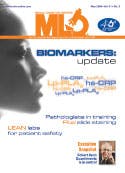Letters to the editor
Readers Respond
Who coined POCT”
I was the senior author of the publication referred
to as “a clarifying position paper” on POCT (Chest. 1999:115;
1140-1154) referred to in the Editor's note of MLO March
2009, Vol. 41, No. 5, page 6. I have not checked the following comments
with my co-authors, whose recollections might well be better than mine.
But I remember that the term “point of …” was borrowed from the lexicon
of the computer-application world.
“Point of sale” referred to the transformational
experience of shoppers in grocery store check-out lines whose purchases
were bar coded and the bar codes scanned. The pricing and recording of
items was automated, immediate, and error-proof. By this amazing
technological feat, stocking and inventory management was systematized
and made efficient in a way that was not previously available to
managers. Analyses of all sorts — such as cumulative records, trends,
etc. — all became possible. That technology obviously was effective in
many industries and setting besides the supermarket.
By adopting similar verbiage, the manufacturers of
devices that measured, either qualitatively or quantitatively, the
colors in the once humble urine test strip, elevated their product into
the vaunted high-technology world associated with the most advanced
non-military computer applications. It was a stroke of marketing genius.
Personally, I harbor a concern about ambiguous,
non-descriptive, and potentially confusing or misleading terminologies.
Is “lateral flow” something like capillary action” How did “waived
tests” (that once connoted such extreme simplicity that anyone could do
them errorlessly and with which no substantial adverse consequence could
occur if an error was made) come to include numerous uncommon analytes
that are tested by very sophisticated technologies by very
unsophisticated personnel, with results upon which important medical
decisions are made”
I would bet that many laboratorians could give their own
favorite examples of troubling borrowed terms. Do other readers have
different ideas on this subject” Perhaps it would be interesting to open up
this subject for further discussion.
—James Winkelman, MD
Professor of Pathology, Emeritus
Harvard Medical School
Editor's note: We thank Dr. Winkelman for his
explanation of who coined the term “POCT,” and we open the topic of those
“troubling borrowed terms” for further discussion within these pages.
Training compensation or not”
I was very interested in your article “Transitioning
medical laboratories demand flexibility” from MLO June 2009 (pp.
40-41). At Florida Hospital, we have been working on a plan to prepare for
the “brain drain.” It was mentioned by the panelists that a group of
trainers from experienced employees are used to train new employees.
My question is: Are these trainers compensated any
differently than the other employees” Are they paid differently or rewarded
in another way” Or is training just considered part of the job description”
Thank you.
—Debra E. Pless, MT(ASCP) BB
Laboratory Administrative Coordinator
for Education
Florida Hospital
Orlando, FL
Editor's note: We will forward Ms. Pless' question to the panelists. Look for their
responses in your next issue of MLO.


